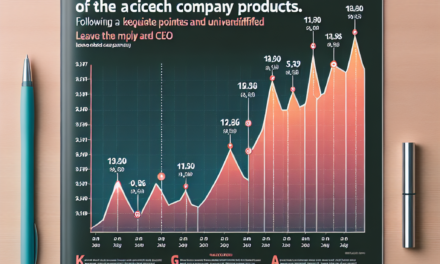“Global Markets Surge: China’s Share Buyback Plan Fuels Investor Optimism”
Introduction
Global stock markets experienced an upswing as China announced a new share buyback financing plan, aimed at bolstering investor confidence and stabilizing its financial markets. The initiative, unveiled by Chinese regulators, allows companies to finance share repurchases through various channels, including bond issuance and bank loans. This move is part of China’s broader strategy to support its economy amid ongoing challenges, including trade tensions and domestic economic slowdown. The announcement has been met with optimism by investors worldwide, leading to a rally in global equities as markets anticipate increased liquidity and corporate investment.
Impact Of China’s Share Buyback Plan On Global Stock Markets
The recent announcement by China regarding its share buyback financing plan has sent ripples through global stock markets, leading to a notable rise in stock prices worldwide. This strategic move by China is aimed at bolstering investor confidence and stabilizing its domestic markets, which have been under pressure due to various economic challenges. As a result, the positive sentiment has transcended borders, influencing global markets and prompting investors to reassess their portfolios.
China’s decision to implement a share buyback financing plan is a significant development in its economic strategy. By allowing companies to repurchase their own shares, China aims to enhance shareholder value and provide a cushion against market volatility. This move is particularly timely, given the recent fluctuations in the Chinese stock market, which have been driven by concerns over economic growth and regulatory changes. The buyback plan is expected to inject liquidity into the market, thereby supporting stock prices and encouraging investment.
The impact of China’s share buyback plan is not confined to its domestic market. Global investors have responded positively to the news, as evidenced by the rise in stock prices across major international indices. This reaction can be attributed to the interconnected nature of today’s financial markets, where developments in one region can have far-reaching effects. The optimism surrounding China’s plan has led to increased investor confidence, which is crucial for sustaining the upward momentum in global stock markets.
Moreover, the timing of China’s announcement is particularly noteworthy. It comes at a juncture when global markets are grappling with uncertainties related to inflation, interest rate hikes, and geopolitical tensions. In this context, China’s proactive approach serves as a stabilizing force, offering a degree of reassurance to investors who have been navigating a complex and often unpredictable financial landscape. The ripple effect of this plan is evident in the performance of various sectors, with technology and consumer goods stocks experiencing significant gains.
In addition to boosting investor sentiment, China’s share buyback plan also underscores the country’s commitment to maintaining economic stability. By prioritizing market confidence and shareholder value, China is signaling its intent to support sustainable growth and mitigate potential risks. This approach aligns with broader global efforts to foster economic resilience in the face of ongoing challenges.
Furthermore, the positive response from global markets highlights the importance of strategic policy measures in shaping investor behavior. As countries continue to navigate the complexities of the post-pandemic recovery, initiatives like China’s share buyback plan serve as valuable tools for promoting market stability and encouraging investment. The plan’s success could potentially inspire similar measures in other regions, further enhancing the interconnectedness of global financial markets.
In conclusion, China’s unveiling of its share buyback financing plan has had a profound impact on global stock markets, driving a wave of optimism and boosting investor confidence. The plan’s strategic timing and focus on enhancing shareholder value have resonated with investors worldwide, underscoring the significance of policy measures in shaping market dynamics. As global markets continue to evolve, the influence of China’s economic strategies will likely remain a key factor in determining the trajectory of international stock prices.
How China’s Economic Policies Influence Global Investment Trends
Global stocks experienced a notable rise recently, driven by China’s announcement of a new share buyback financing plan. This development underscores the significant influence that China’s economic policies exert on global investment trends. As the world’s second-largest economy, China’s financial maneuvers are closely watched by investors worldwide, and its latest policy initiative is no exception. The share buyback financing plan is designed to bolster investor confidence in Chinese markets, which have faced challenges due to economic slowdowns and regulatory changes. By facilitating share buybacks, China aims to stabilize its stock market, enhance corporate valuations, and ultimately attract more foreign investment.
The ripple effects of China’s policy decisions are felt across global markets, as investors recalibrate their strategies in response to new opportunities and risks. The recent rise in global stocks can be attributed to the optimism generated by China’s proactive approach to supporting its domestic market. This optimism is not unfounded, as share buybacks can lead to increased earnings per share and higher stock prices, making Chinese companies more attractive to both domestic and international investors. Consequently, global investors are likely to increase their exposure to Chinese equities, which in turn can lead to a broader rally in global stock markets.
Moreover, China’s economic policies often serve as a barometer for the health of the global economy. When China implements measures to stimulate growth, it signals a commitment to maintaining economic stability, which can have a reassuring effect on global investors. This is particularly important in the current economic climate, where uncertainties such as geopolitical tensions and inflationary pressures continue to pose challenges. By taking decisive action, China not only addresses its domestic economic concerns but also contributes to a more stable global investment environment.
In addition to the direct impact on stock markets, China’s share buyback financing plan may also influence other asset classes. For instance, increased investor confidence in Chinese equities could lead to a stronger Chinese yuan, as foreign capital flows into the country. A stronger yuan can have implications for global currency markets, affecting exchange rates and trade balances. Furthermore, as investors seek to capitalize on opportunities in China, there may be a shift in capital allocation away from other emerging markets, which could experience reduced investment inflows as a result.
It is also worth noting that China’s economic policies are often interconnected with its broader geopolitical strategies. By enhancing the attractiveness of its stock market, China may be seeking to assert its economic influence on the global stage. This could be part of a larger strategy to strengthen its position in international trade and finance, particularly as it navigates complex relationships with other major economies. As such, global investors must remain vigilant and consider the broader geopolitical context when assessing the implications of China’s economic policies.
In conclusion, China’s unveiling of a share buyback financing plan has provided a boost to global stocks, highlighting the far-reaching impact of its economic policies on global investment trends. As investors respond to this development, they must consider not only the immediate opportunities presented by China’s market but also the broader implications for global financial markets. By understanding the interconnectedness of China’s economic strategies and their influence on global investment dynamics, investors can make more informed decisions in an increasingly complex and interdependent world.
The Role Of Share Buybacks In Boosting Investor Confidence
Global stocks experienced a notable rise recently, driven by China’s announcement of a new share buyback financing plan. This development has sparked discussions about the role of share buybacks in boosting investor confidence, a topic that has long been debated among economists and market analysts. Share buybacks, also known as stock repurchases, occur when a company buys back its own shares from the marketplace, reducing the number of outstanding shares. This action can have several implications for both the company and its investors, often leading to a positive impact on stock prices.
To begin with, share buybacks can signal to investors that a company believes its stock is undervalued. When a company repurchases its shares, it demonstrates confidence in its financial health and future prospects. This can reassure investors, leading to increased demand for the stock and, consequently, a rise in its price. In the case of China’s recent plan, the government’s support for share buybacks may be interpreted as a commitment to stabilizing and strengthening its financial markets, thereby encouraging both domestic and international investors to maintain or increase their investments in Chinese stocks.
Moreover, share buybacks can improve a company’s financial metrics, such as earnings per share (EPS). By reducing the number of shares outstanding, a company can increase its EPS, even if its net income remains constant. This can make the company appear more profitable and attractive to investors, further boosting its stock price. In addition, buybacks can be a more flexible way for companies to return capital to shareholders compared to dividends, as they do not commit the company to regular cash outflows.
However, it is important to consider the potential downsides of share buybacks. Critics argue that companies may prioritize buybacks over other investments, such as research and development or capital expenditures, which could be more beneficial for long-term growth. Additionally, buybacks can sometimes be used to artificially inflate stock prices, benefiting executives with stock-based compensation at the expense of long-term shareholder value. Therefore, while buybacks can boost investor confidence in the short term, they must be executed with careful consideration of the company’s overall strategy and financial health.
In the context of global markets, China’s share buyback financing plan has broader implications. As one of the world’s largest economies, China’s financial policies can significantly influence global investor sentiment. By facilitating share buybacks, China aims to enhance the attractiveness of its stock market, potentially leading to increased foreign investment. This, in turn, can have a ripple effect on other markets, as investors may feel more optimistic about the global economic outlook.
Furthermore, the timing of China’s announcement is noteworthy, as it comes amid ongoing economic challenges, including trade tensions and slowing growth. By implementing measures to support its stock market, China is taking proactive steps to mitigate these challenges and instill confidence among investors. This move aligns with a broader trend of governments and central banks around the world adopting policies to support financial markets in times of uncertainty.
In conclusion, while share buybacks can play a significant role in boosting investor confidence, they are not without their complexities and potential drawbacks. China’s recent plan highlights the importance of strategic financial policies in shaping market dynamics and influencing investor sentiment. As global markets continue to evolve, the impact of such measures will remain a critical area of focus for investors and policymakers alike.
Analyzing The Short-Term And Long-Term Effects Of China’s Financial Strategies

Global stocks experienced a notable uptick following China’s recent announcement of a share buyback financing plan, a move that has captured the attention of investors worldwide. This strategic initiative by China aims to bolster its domestic markets and restore investor confidence amid ongoing economic challenges. In the short term, the plan is expected to provide immediate relief to Chinese companies by enhancing their liquidity and stabilizing stock prices. By allowing firms to repurchase their own shares, the initiative can reduce the number of shares available in the market, thereby increasing earnings per share and potentially boosting stock valuations. This immediate impact is likely to be welcomed by investors who have been wary of the volatility in Chinese markets.
Moreover, the ripple effects of this plan are being felt beyond China’s borders, as global markets respond positively to the prospect of a more stable Chinese economy. Investors around the world are closely monitoring China’s financial strategies, given the country’s significant influence on global trade and economic growth. The share buyback plan is perceived as a proactive measure to address economic uncertainties, which in turn has contributed to a sense of optimism in international markets. This optimism is reflected in the rise of global stock indices, as investors anticipate that a more robust Chinese economy could lead to increased demand for goods and services worldwide.
However, while the short-term effects of China’s share buyback financing plan appear promising, it is crucial to consider the potential long-term implications. One of the primary concerns is whether this strategy will lead to sustainable economic growth or merely provide a temporary boost. Critics argue that share buybacks, while effective in the short term, do not address underlying structural issues within the economy. There is a risk that companies may prioritize buybacks over investments in innovation, research, and development, which are essential for long-term growth and competitiveness.
Furthermore, the success of this plan largely depends on the broader economic context, including China’s ability to manage its debt levels and navigate geopolitical tensions. The country’s economic policies will need to strike a delicate balance between stimulating growth and maintaining financial stability. In the long run, China’s commitment to implementing comprehensive reforms will be crucial in determining the effectiveness of its financial strategies. These reforms may include measures to enhance transparency, improve corporate governance, and foster a more open and competitive market environment.
In addition, the global community will be closely watching how China’s financial strategies align with its environmental and social goals. As the world increasingly prioritizes sustainable development, China’s approach to balancing economic growth with environmental responsibility will be a key factor in shaping its long-term economic trajectory. Investors are becoming more discerning, seeking opportunities that align with environmental, social, and governance (ESG) criteria. Therefore, China’s ability to integrate these considerations into its financial strategies will be instrumental in attracting long-term investment.
In conclusion, China’s share buyback financing plan has provided a much-needed boost to global stocks, reflecting a positive short-term outlook. However, the long-term success of this strategy will depend on China’s ability to address structural challenges, implement meaningful reforms, and align its economic policies with global sustainability goals. As the world continues to navigate an increasingly complex economic landscape, China’s financial strategies will remain a focal point for investors seeking to understand the future direction of global markets.
Global Market Reactions To China’s Economic Announcements
Global stocks experienced a notable uptick following China’s recent announcement of a new share buyback financing plan, a move that has been interpreted as a strategic effort to bolster investor confidence and stimulate economic growth. This development comes at a time when global markets are closely monitoring China’s economic policies, given the country’s significant influence on the world economy. The announcement has been met with optimism, as it signals China’s commitment to supporting its domestic companies and, by extension, the broader market.
The share buyback financing plan is designed to provide Chinese companies with greater flexibility in managing their capital structures. By facilitating share buybacks, companies can potentially enhance shareholder value, reduce outstanding shares, and improve earnings per share. This initiative is particularly timely, as many Chinese firms have been grappling with the dual challenges of a slowing domestic economy and external pressures, such as trade tensions and geopolitical uncertainties. Consequently, the plan is expected to provide a much-needed boost to corporate confidence and financial stability.
In response to this announcement, global markets have reacted positively, with major indices in Asia, Europe, and the United States showing gains. Investors have interpreted the move as a sign of China’s proactive approach to addressing economic challenges, which has, in turn, alleviated some of the concerns surrounding the country’s growth prospects. Moreover, the plan is seen as a part of a broader set of measures aimed at revitalizing the Chinese economy, including fiscal stimulus and monetary easing.
The ripple effect of China’s announcement has been felt across various sectors, with technology, manufacturing, and consumer goods companies experiencing significant gains. This is largely due to the fact that these sectors are heavily reliant on China’s economic health, given the country’s role as a major consumer and producer in the global market. As a result, the positive sentiment has extended beyond China’s borders, contributing to a more optimistic outlook for global economic growth.
Furthermore, the share buyback financing plan has also had an impact on investor sentiment regarding emerging markets. As China is a key player in this space, its economic policies often set the tone for investor confidence in other emerging economies. The announcement has thus provided a boost to emerging market stocks, which have been under pressure due to concerns about slowing global growth and rising interest rates in developed economies.
While the immediate market reaction has been positive, it is important to consider the potential long-term implications of China’s share buyback financing plan. On one hand, the initiative could lead to increased corporate investment and innovation, as companies are able to allocate resources more efficiently. On the other hand, there is a risk that excessive buybacks could divert funds away from productive investments, potentially hindering long-term growth.
In conclusion, China’s unveiling of a share buyback financing plan has had a significant impact on global markets, instilling a sense of optimism among investors and highlighting the country’s commitment to supporting its economy. As the world continues to navigate an increasingly complex economic landscape, China’s actions will undoubtedly remain a focal point for market participants. The positive market reaction underscores the interconnectedness of the global economy and the importance of strategic economic policies in fostering stability and growth.
The Interplay Between Chinese Economic Policies And Global Stock Performance
Global stock markets have experienced a notable upswing following China’s recent announcement of a share buyback financing plan, a move that underscores the intricate relationship between Chinese economic policies and global stock performance. This development comes at a time when investors worldwide are closely monitoring China’s economic strategies, given the country’s significant influence on global markets. The unveiling of this plan has injected a sense of optimism into the financial markets, as it signals China’s commitment to stabilizing its economy and supporting its corporate sector.
The share buyback financing plan is designed to provide Chinese companies with the necessary capital to repurchase their own shares, thereby boosting their stock prices and enhancing shareholder value. This initiative is particularly timely, as it addresses concerns about the slowing growth in the world’s second-largest economy. By facilitating share buybacks, the Chinese government aims to bolster investor confidence and stimulate domestic consumption, which are crucial for sustaining economic momentum.
Moreover, the ripple effects of China’s policy decisions are felt far beyond its borders. As a major player in the global economy, China’s actions have a profound impact on international trade, investment flows, and market sentiment. Consequently, the announcement of the share buyback financing plan has been met with enthusiasm by investors around the world, who view it as a positive step towards stabilizing global markets. This optimism is reflected in the recent rise in global stock indices, as investors anticipate that the plan will help mitigate some of the economic challenges facing China.
In addition to boosting domestic markets, China’s share buyback financing plan is likely to have broader implications for global stock performance. For instance, it may lead to increased demand for commodities and raw materials, as Chinese companies ramp up production to meet the anticipated rise in consumer demand. This, in turn, could benefit commodity-exporting countries and contribute to a more balanced global economic recovery. Furthermore, the plan may encourage other countries to adopt similar measures, thereby fostering a more coordinated approach to addressing economic uncertainties.
However, it is important to recognize that the interplay between Chinese economic policies and global stock performance is complex and multifaceted. While the share buyback financing plan has generated positive momentum, it is not a panacea for all the challenges facing the global economy. Factors such as geopolitical tensions, inflationary pressures, and supply chain disruptions continue to pose risks to market stability. Therefore, investors must remain vigilant and consider a range of factors when assessing the potential impact of China’s policies on global stock performance.
In conclusion, China’s unveiling of a share buyback financing plan has provided a much-needed boost to global stock markets, highlighting the significant influence of Chinese economic policies on international financial dynamics. As investors navigate the evolving landscape, they will continue to closely monitor China’s policy decisions and their implications for global markets. While the plan offers a glimmer of hope for stabilizing the Chinese economy and supporting global stock performance, it is essential to remain cognizant of the broader economic challenges that lie ahead. Through careful analysis and strategic decision-making, investors can better position themselves to capitalize on the opportunities and navigate the risks associated with the interplay between Chinese economic policies and global stock performance.
Understanding The Mechanisms Of Share Buybacks In China’s Financial Markets
Global stocks have experienced a notable uptick following China’s recent announcement of a new share buyback financing plan. This development has captured the attention of investors worldwide, as it signals a strategic move by China to bolster its financial markets and enhance investor confidence. To fully appreciate the implications of this plan, it is essential to understand the mechanisms of share buybacks and their potential impact on China’s financial landscape.
Share buybacks, also known as share repurchases, occur when a company purchases its own shares from the marketplace. This action reduces the number of outstanding shares, often leading to an increase in the value of the remaining shares. Companies typically engage in buybacks to return capital to shareholders, improve financial ratios, or signal confidence in their future prospects. In the context of China’s financial markets, the introduction of a share buyback financing plan represents a significant policy shift aimed at stabilizing and invigorating the market.
The Chinese government’s decision to facilitate share buybacks is particularly noteworthy given the country’s traditionally cautious approach to such financial maneuvers. Historically, Chinese companies have been more inclined to reinvest profits into expansion and development rather than returning capital to shareholders. However, the recent economic challenges, exacerbated by global uncertainties and domestic pressures, have prompted a reevaluation of strategies to sustain market vitality.
By enabling companies to finance share buybacks, China aims to provide firms with greater flexibility in managing their capital structures. This move is expected to encourage companies to optimize their balance sheets, potentially leading to improved financial health and increased shareholder value. Moreover, the plan is likely to instill greater confidence among investors, both domestic and international, as it demonstrates the government’s commitment to supporting the market.
The ripple effects of this policy are already being felt across global stock markets. Investors, buoyed by the prospect of enhanced corporate performance and stability in China, have responded positively, driving up stock prices worldwide. This reaction underscores the interconnectedness of global financial markets and highlights the influence of China’s economic policies on international investor sentiment.
Furthermore, the share buyback financing plan aligns with China’s broader economic objectives. As the country seeks to transition from an investment-driven growth model to one that is more consumption-oriented, fostering a robust and resilient financial market becomes increasingly important. By promoting share buybacks, China is not only addressing immediate market concerns but also laying the groundwork for a more sustainable economic future.
In addition to its immediate market impact, the plan may also encourage a cultural shift within Chinese corporations. As companies become more accustomed to returning capital to shareholders, there may be a gradual shift towards prioritizing shareholder value alongside traditional growth metrics. This evolution could lead to a more dynamic and competitive corporate landscape, ultimately benefiting the broader economy.
In conclusion, China’s unveiling of a share buyback financing plan marks a pivotal moment in the country’s financial market strategy. By facilitating share repurchases, the government aims to stabilize the market, enhance investor confidence, and support long-term economic objectives. As global stocks rise in response, the interconnected nature of today’s financial markets is once again highlighted, demonstrating the far-reaching impact of China’s economic policies. As this plan unfolds, it will be crucial to monitor its effects on both domestic and international markets, as well as its potential to reshape corporate practices in China.
Q&A
1. **What prompted the rise in global stocks?**
The rise in global stocks was prompted by China’s unveiling of a share buyback financing plan.
2. **What is the purpose of China’s share buyback financing plan?**
The plan aims to boost investor confidence and stabilize the stock market by allowing companies to repurchase their own shares.
3. **How did the Chinese stock market react to the announcement?**
The Chinese stock market saw a positive reaction, with major indices experiencing gains following the announcement.
4. **Which sectors benefited the most from the share buyback plan?**
Sectors such as technology, finance, and consumer goods benefited the most from the share buyback plan.
5. **How did international markets respond to China’s plan?**
International markets responded positively, with many global indices experiencing an uptick due to increased investor optimism.
6. **What are the potential long-term effects of the share buyback plan on China’s economy?**
The potential long-term effects include increased market stability, improved corporate valuations, and enhanced investor confidence in China’s economic policies.
7. **Are there any criticisms of the share buyback financing plan?**
Some critics argue that the plan may lead to short-term market manipulation and does not address underlying economic challenges.
Conclusion
The announcement of China’s share buyback financing plan has positively impacted global stock markets, leading to a rise in stock prices. This move is perceived as a strategic effort by China to bolster investor confidence and stimulate economic growth by encouraging companies to repurchase their shares, thereby enhancing shareholder value. The plan has been welcomed by investors worldwide, reflecting optimism about China’s commitment to stabilizing its financial markets and supporting corporate performance. As a result, the global stock market has experienced a boost, with increased investor sentiment and renewed interest in equities, particularly those with exposure to the Chinese market.





